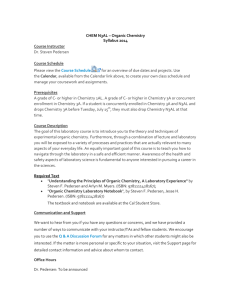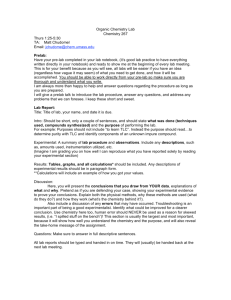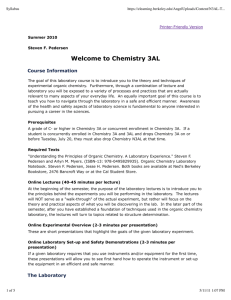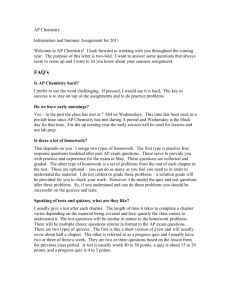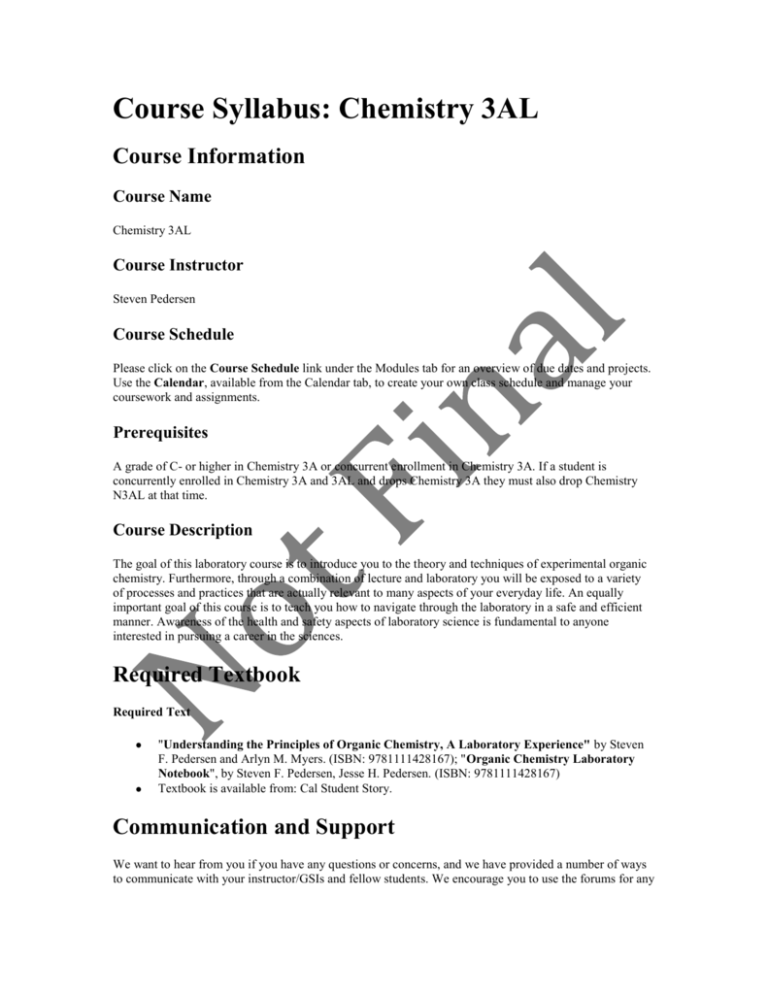
Course Syllabus: Chemistry 3AL
Course Information
Course Name
Chemistry 3AL
Course Instructor
Steven Pedersen
Course Schedule
Please click on the Course Schedule link under the Modules tab for an overview of due dates and projects.
Use the Calendar, available from the Calendar tab, to create your own class schedule and manage your
coursework and assignments.
Prerequisites
A grade of C- or higher in Chemistry 3A or concurrent enrollment in Chemistry 3A. If a student is
concurrently enrolled in Chemistry 3A and 3AL and drops Chemistry 3A they must also drop Chemistry
N3AL at that time.
Course Description
The goal of this laboratory course is to introduce you to the theory and techniques of experimental organic
chemistry. Furthermore, through a combination of lecture and laboratory you will be exposed to a variety
of processes and practices that are actually relevant to many aspects of your everyday life. An equally
important goal of this course is to teach you how to navigate through the laboratory in a safe and efficient
manner. Awareness of the health and safety aspects of laboratory science is fundamental to anyone
interested in pursuing a career in the sciences.
Required Textbook
Required Text
"Understanding the Principles of Organic Chemistry, A Laboratory Experience" by Steven
F. Pedersen and Arlyn M. Myers. (ISBN: 9781111428167); "Organic Chemistry Laboratory
Notebook", by Steven F. Pedersen, Jesse H. Pedersen. (ISBN: 9781111428167)
Textbook is available from: Cal Student Story.
Communication and Support
We want to hear from you if you have any questions or concerns, and we have provided a number of ways
to communicate with your instructor/GSIs and fellow students. We encourage you to use the forums for any
matters in which other students might also be interested. If the matter is more personal or specific to your
situation, visit the Support page for detailed contact information and advise about whom to contact.
Office Hours
Dr. Pedersen: To be announced
Teaching assistants: To be announced
None of these office hours are online.
VERY IMPORTANT
You won't be able to access your course material until you read and make your pledge to Academic
Integrity. Go to the Modules page and click on the "START HERE" link. Click on the first link, "READ
THIS", to learn about what constitutes cheating, plagiarism, and false information. If you think you already
know, think again! You'll be surprised by what you find out. As a UC Berkeley student, you are expected to
abide by these rules. Once you've read the agreement, click "AGREE TO THIS". Once you've clicked
"OK", you gain access to the course.
Assignments
Online Lectures (40-45 minutes per lecture)
At the beginning of the semester, the purpose of the laboratory lectures is to introduce you to the principles
behind the experiments you will be performing in the laboratory. The lectures will NOT serve as a "walkthrough" of the actual experiment, but rather will focus on the theory and practical aspects of what you will
be discovering in the lab. In the later part of the semester, after you have established a foundation of
techniques used in the organic chemistry laboratory, the lectures will turn to topics related to structure
determination.
Online Experimental Overview (2-3 minutes per presentation)
These are short presentations that highlight the goals of the given laboratory experiment.
Online Laboratory Set-up and Safety Demonstrations (2-3 minutes per
presentation)
If a given laboratory requires that you use instruments and/or equipment for the first time, these
presentations will allow you to see first hand how to operate the instrument or set-up the equipment in an
efficient and safe manner.
The Laboratory
Laboratories are 4 hours long. You should plan on being in lab for this period of time. Most experiments in
Chemistry N3AL are designed to have you investigate a subject(s) and then solve a problem or reach a
conclusion. Many of the experiments require that you work in groups of 2-4 students so that several pieces
of data can be collected and then analyzed. Group work requires cooperation and sometimes, patience. It is
important to check each other's data and discuss with each other whether or not that data is consistent with
what was expected. If not, then the experiment should be redone.
Lab Attendance and Lab Reports
There are eight graded experiments. Each experiment is worth 10 points. Your lowest lab score will be
dropped.
In order to receive points for any given lab, the following conditions must be met:
Prior to attending any given laboratory period you must have completed all of the reading
assignments and viewed the online lecture(s) and any videos associated with that experiment or
lab period. You must also have completed the online prelab quiz no later than 4 hours before a lab
period begins. If you have not met these requirements, you will not be allowed to attend lab for
that day.
You must arrive to lab on time, which means no later than 1:10 PM for afternoon labs and 6:10
PM for evening labs. In general, the first 10-15 minutes of every laboratory period are dedicated to
a safety discussion, which is an important part of the experiment. Therefore, if you show up late
you will not be allowed to participate in lab for that day.
You must have prepared a prelab. Your prelab must include, as a minimum, what is asked for in
the laboratory manual at the beginning of the experiment. If you have not prepared a prelab, you
will not be allowed to perform the experiment.
You must attend lab.
You must wear protective clothing and eyewear during the laboratory period. Your TA can ask
you to leave the lab for the day if you are not wearing such clothing or eyewear.
You must record detailed observations about the experiment. Do not just make a checklist of what
you are supposed to do and then check off the procedures as you carry them out without making
observations as to what actually happened. All observations must be written in your lab notebook
during, not after, the laboratory period.
You must record all expected data during, not after, the laboratory period. This includes melting
points, TLC plates, yields, etc.
Before leaving lab, you must meet with your TA who will ask you to confirm that certain data is
present in your notebook. Upon confirmation, the TA will initial the notebook. At this point, you
are to provide them with the white pages of your notebook that were used in lab that day.
If you do not complete all of these conditions for any given lab, you will receive a 0 for that experiment.
The consequences of a 0 are as follows:
You will not receive any points for that experiment. This will be your dropped lab score.
If you receive two zero's during the semester, you not only will lose a total of 10 points, but your
course grade will also be dropped by one third of a grade. For example, if you earn enough points
to get a B+ in the class, but you have two zero's, you will receive a B.
If you receive three zero's you will receive a failing grade in the course.
Worksheets
There are three worksheets that will be worked on only during the assigned laboratory periods. Each is
worth 5 points. None of these can be used as a dropped lab score.
In Class Lab Reports (ICLR)
There will be no formal lab reports due for each laboratory period you attend. Instead, twice during the
semester there will be an In Class Lab Report (ICLR). During the ICLR lab period you will be expected to
write a lab report on one of the experiments that you performed prior to the ICLR period. The experiment
that you will be writing an ICLR for will be announced during the assigned lab period. Therefore, you will
need to be prepared to write a ICLR for all the experiments included in that particular ICLR cycle (see the
lab schedule for details). The lab report will consist of writing a discussion that is similar to, but not
necessarily exactly the same as the discussion “bullets” found at the end of each experiment. You will also
be asked to answer lab report questions similar to, but not necessarily exactly the same as the questions
found at the end of each experiment. You will also need to perform calculations relevant to any particular
experiment. Finally you will need to include a short conclusion.
During the ICLR periods you will be allowed to use your lab textbook and you will be given a copy of your
in-lab observations for the experiment you choose. No calculators will be allowed (simple calculators will
be made available in the lab) and you cannot use your lab notebook.
ATTENDANCE AT THESE PARTICULAR LAB PERIODS IS MANDATORY. NEITHER ONE
OF THESE LAB PERIODS CAN BE USED AS YOUR “DROPPED” SCORE.
Online Prelab Quizzes
Prior to each laboratory experiment, all students must pass a prelab quiz relevant to the given experiment. If
you have prepared a prelab in your laboratory notebook, passing these quizzes will be simple. Each quiz
will consist of four questions. A passing score is 100%. You will be given 5 minutes for each quiz attempt.
Each quiz you attempt will consist of different questions. You may take these quizzes up until 4 hours
before the beginning of your lab period. At this time, you can no longer take a quiz. If you have not taken a
quiz or have not passed a quiz prior to this time limit, you will not be allowed to participate in that
particular experiment. There are no points associated with prelab quizzes.
Online Discussions
There are two online discussion periods during the semester. During these times you will be asked to
participate in an online discussion relating to a subject posed to your laboratory section by the course
instructor. These discussions will be related to both the online lectures and what you have been working on
in the laboratory. There is a participation grade for these discussion periods. Depending on the level of your
meaningful participation you will receive between 1 and 5 points. If you choose not to participate, you will
receive 0 points.
Lab Final
There will be one on-campus lab exam on Wednesday, August 5th from 8-9 p.m., location TBA. This exam
will focus on the information discussed in the online lectures and the material covered in the three
worksheets. The exam is worth 30 points. This exam MUST be taken AND a score of ≥ 10 points must be
obtained in order to complete the class. That is, if you score less than 10 points on the exam, you will
receive an incomplete in the class regardless of how many total points you have accumulated. The
incomplete will need to be satisfied within two semesters by taking the lab exam offered in Chemistry 3AL
in either Fall of 2015 or Spring of 2016. A score of ≥ 10 points will warrant completion of the course. Until
the incomplete grade is satisfied, you will not be allowed to take Chemistry 3BL. Note: If you already have
three zero's in the course at the time of the lab exam, you do not need to take the lab exam as you have
already failed the course.
Grades
The point total for this course is 155 points. These are broken down as follows:
70 points for lab attendance and lab observations
30 points for Class Lab Reports
15 points for in-lab worksheets
10 points for online discussions
30 points for the laboratory exam
Policies
Students with Disabilities
We have provided text transcripts of all of the recorded lessons at the end of each module. The TXT files
are in a zipped folder for download.
Any students requiring course accommodations due to a physical, emotional, or learning disability must
contact the Disabled Students' Program (DSP), http://dsp.berkeley.edu/services.html, at the beginning of
the course with their request. The DSP will review all requests on an individual basis. Please have your
Disabled Student Program Specialist send the instructor a formal request prior to the course start date.
Academic Integrity
Collaboration and Independence: Reviewing lecture and reading materials and studying for exams can be
enjoyable and enriching things to do with fellow students. This is recommended. However, unless
otherwise instructed, homework assignments are to be completed independently and materials submitted as
homework should be the result of one’s own independent work.
Cheating: A good lifetime strategy is always to act in such a way that no one would ever imagine that you
would even consider cheating. Anyone caught cheating on a quiz or exam in this course will receive a
failing grade in the course and will also be reported to the University Center for Student Conduct. In order
to guarantee that you are not suspected of cheating, please keep your eyes on your own materials and do
not converse with others during the quizzes and exams.
Plagiarism: To copy text or ideas from another source without appropriate reference is plagiarism and will
result in a failing grade for your assignment and usually further disciplinary action. For additional
information on plagiarism and how to avoid it, see, for example:
http://www.lib.berkeley.edu/instruct/guides/citations.html#Plagiarism
http://gsi.berkeley.edu/teachingguide/misconduct/prevent-plag.html
Academic Integrity and Ethics: Cheating on exams and plagiarism are two common examples of
dishonest, unethical behavior. Honesty and integrity are of great importance in all facets of life. They help
to build a sense of self-confidence, and are key to building trust within relationships, whether personal or
professional. There is no tolerance for dishonesty in the academic world, for it undermines what we are
dedicated to doing - furthering knowledge for the benefit of humanity.
© 2013 UC Regents. All rights reserved.

